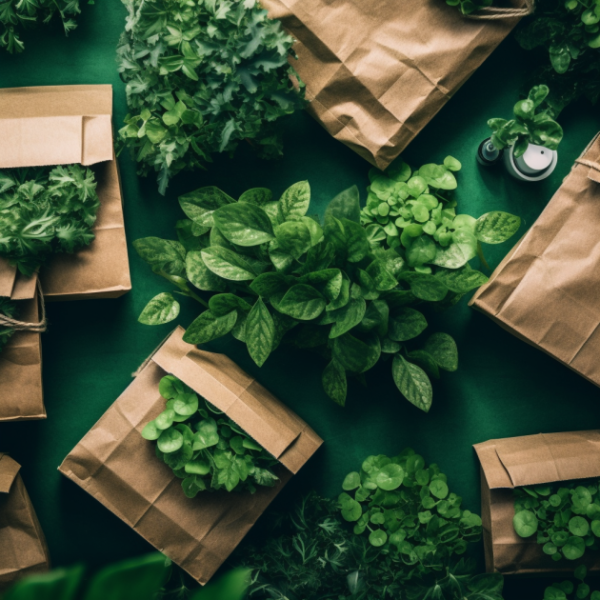Composting is a powerful way to reduce waste, minimize environmental impact, and create nutrient-rich soil for your garden. By diverting food scraps from landfills and turning them into compost, you can contribute to a more sustainable and eco-friendly lifestyle. In this article, we will explore the benefits of composting, how to get started, and its impact on promoting a circular economy.

Why Composting Matters
- Reducing Waste and Landfill ImpactComposting offers an effective solution to reduce the amount of organic waste that ends up in landfills. Food scraps, yard trimmings, and other compostable materials make up a significant portion of municipal solid waste. When sent to landfills, these organic materials decompose anaerobically, releasing methane—a potent greenhouse gas contributing to climate change. By composting, we divert these materials from landfills, reducing methane emissions and alleviating the strain on waste management systems.
- Creating Nutrient-Rich SoilOne of the main benefits of composting is the creation of nutrient-rich soil, often referred to as “black gold” for gardeners. Compost is a natural fertilizer that improves soil structure, moisture retention, and nutrient content. It enhances plant growth, promotes healthy root development, and increases soil biodiversity. By incorporating compost into your garden beds or potted plants, you provide a sustainable and eco-friendly source of nutrients, reducing the need for synthetic fertilizers.
- Closing the Loop: A Circular Economy ApproachComposting embodies the principles of a circular economy, where resources are reused, recycled, and regenerated. By composting food scraps and other organic materials, we create a closed-loop system. The compost produced can then be used to nourish the soil, grow new plants, and complete the cycle of nature. It’s a sustainable practice that minimizes waste, conserves resources, and promotes ecological balance.
Getting Started with Composting
- Choose a Composting MethodThere are several composting methods to suit different lifestyles and available space:
- Backyard Composting: Ideal for homeowners with a yard or garden. It involves creating a compost pile or using a compost bin to decompose organic materials.
- Vermicomposting: Perfect for those with limited space or living in apartments. Vermicomposting utilizes worms, such as red wigglers, to break down food scraps and produce nutrient-rich worm castings. Consider using a dual-chamber composter for efficient vermicomposting.
- Community Composting: If you don’t have space or time for composting at home, consider participating in a community composting program. Many communities offer shared composting facilities where residents can drop off their food scraps.
- Gather Compostable MaterialsYou can compost a wide range of organic materials, including:
- Fruit and vegetable scraps
- Coffee grounds and filters
- Tea bags
- Eggshells
- Yard waste (leaves, grass clippings)
- Shredded paper and cardboard
- Start CompostingFollow these steps to start composting:
- Layering: Begin by creating a base layer of yard waste or shredded paper. Add food scraps and other compostable materials in alternating layers.
- Moisture Management: Keep the compost pile moist but not waterlogged. Aim for a moisture level similar to a damp sponge.
- Aeration: Regularly turn or aerate the compost pile to provide oxygen for the decomposition process. This can be done using a compost fork or by using an outdoor tumbling composter.
- Patience and Time: Composting is a natural process that takes time. Depending on the conditions, it can take several months to a year for the compost to fully mature.
- Utilizing the CompostOnce your compost has transformed into dark, crumbly soil, it’s ready to be used in your garden. Here are some ways to utilize the nutrient-rich compost:
- Soil Amendment: Mix the compost into your garden beds to improve soil fertility, structure, and water retention.
- Mulching: Spread a layer of compost around your plants to suppress weeds, conserve moisture, and provide a slow release of nutrients.
- Potting Mix: Blend the compost with potting soil to create a nutrient-rich mix for container gardening.
- Seed Starting: Use compost as a component in homemade seed-starting mixes to provide a nurturing environment for young plants.
Embrace Sustainable Living through Composting
Composting is a simple yet impactful way to reduce waste, enrich the soil, and contribute to a healthier planet. By composting your food scraps and organic materials, you actively participate in the sustainable living movement. Composting aligns with the principles of LivableWays.com, where you can explore a range of sustainable products that promote eco-friendly practices.
Dual Chamber Composter <<<<<—-click to buy with our amazon link, we hope you get the best price possible!
Join the composting revolution today and witness the transformative power of turning food scraps into nutrient-rich soil. Together, we can create a greener and more sustainable future!
As an Amazon Associate we earn from qualifying purchases through some links in our articles.




